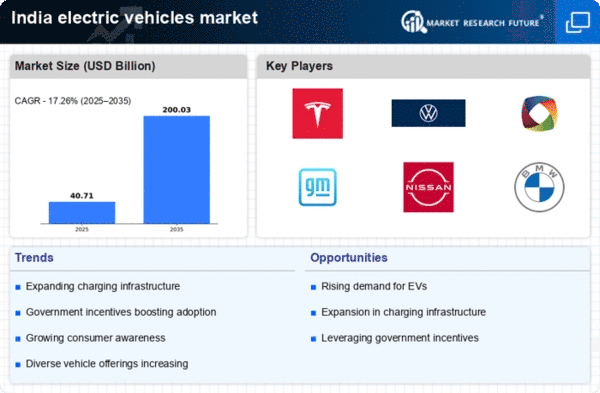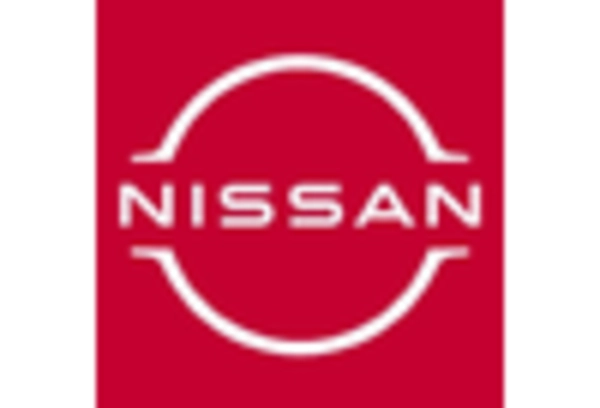Rising Environmental Awareness
The increasing awareness of environmental issues among the Indian populace appears to be a pivotal driver for the electric vehicles market. As citizens become more conscious of air pollution and climate change, there is a growing demand for cleaner transportation options. Reports indicate that urban areas in India experience severe air quality issues, prompting consumers to seek alternatives to traditional fossil fuel vehicles. This shift in consumer behavior is likely to bolster the electric vehicles market, as individuals and organizations alike prioritize sustainability. Furthermore, government initiatives aimed at promoting electric mobility resonate with this environmental consciousness, potentially leading to a more robust market presence. The electric vehicles market in India may witness a surge in demand as more consumers opt for eco-friendly vehicles, aligning their purchasing decisions with their values regarding environmental stewardship.
Economic Viability of Electric Vehicles
The economic viability of electric vehicles is becoming increasingly apparent, which may significantly influence the electric vehicles market in India. With the cost of electric vehicle technology gradually decreasing, the initial purchase price of electric vehicles is expected to become more competitive with traditional vehicles. Additionally, the total cost of ownership for electric vehicles is often lower due to reduced fuel and maintenance costs. For instance, electric vehicles can offer savings of up to 40% in fuel costs compared to petrol or diesel vehicles. This economic advantage is likely to attract a broader consumer base, including cost-conscious buyers. As the electric vehicles market continues to evolve, the financial incentives provided by the government, such as subsidies and tax rebates, further enhance the appeal of electric vehicles, making them a more attractive option for Indian consumers.
Government Support and Policy Framework
The supportive policy framework established by the Indian government is a critical driver for the electric vehicles market. Initiatives such as the Faster Adoption and Manufacturing of Electric Vehicles (FAME) scheme provide financial incentives for both manufacturers and consumers, thereby stimulating market growth. Additionally, state-level policies that promote electric vehicle adoption through subsidies and tax exemptions further enhance the attractiveness of electric vehicles. The government's commitment to achieving a significant reduction in carbon emissions by 2030 aligns with the promotion of electric mobility, indicating a long-term strategy to support the electric vehicles market. This robust policy environment is likely to encourage investments in electric vehicle infrastructure and manufacturing, fostering a conducive ecosystem for market expansion.
Urbanization and Changing Mobility Patterns
The rapid urbanization in India is reshaping mobility patterns, which may serve as a catalyst for the electric vehicles market. As cities expand and populations grow, the demand for efficient and sustainable transportation solutions is becoming increasingly urgent. Urban areas are often characterized by traffic congestion and pollution, prompting a shift towards electric vehicles as a viable alternative. The convenience of electric vehicles, particularly in urban settings where short commutes are common, aligns well with the changing preferences of consumers. Furthermore, the rise of shared mobility services, such as electric ride-hailing and car-sharing platforms, is likely to enhance the visibility and adoption of electric vehicles. This trend suggests that the electric vehicles market may experience significant growth as urban residents seek practical and eco-friendly transportation options.
Technological Innovations in Electric Vehicles
Technological innovations are playing a crucial role in shaping the electric vehicles market in India. Advances in battery technology, such as improved energy density and faster charging capabilities, are enhancing the performance and appeal of electric vehicles. For instance, the introduction of lithium-ion batteries has significantly increased the range of electric vehicles, addressing one of the primary concerns of potential buyers. Moreover, the integration of smart technologies, such as vehicle-to-grid systems and advanced driver-assistance systems, is likely to enhance user experience and safety. These innovations not only improve the functionality of electric vehicles but also contribute to their growing acceptance among consumers. As the electric vehicles market continues to innovate, it may attract tech-savvy consumers who are eager to embrace the latest advancements in automotive technology.
















